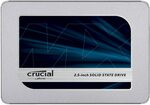500GB is $118.19.
Start your system in seconds, load files almost instantly, accelerate your most demanding applications, store massive data with drive capacities up to 2TB, be more efficient with Micron 3D NAND
Enjoy a cooler, quieter computer and extend laptop battery life using only 100 mW of power, Keep all your saved work if power is unexpectedly cut with Integrated Power Loss Immunity
Get a high price-to performance ratio without needing a financing plan to pay for it, protect your data on a drive that's tried, tested, and proven from start to finish
Block hackers and thieves with AES 256-bit hardware-based encryption, Transfer files easily from old drive with Acronis True Image HD, manage and improve SSD with the crucial storage executive tool
1TB 2.5-inch internal SSD, SATA 6.0Gb/s, 560 MB/s Read, 510 MB/s Write




 CamelCamelCamel
CamelCamelCamel